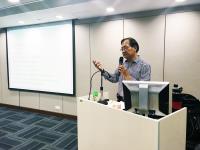Public Culture of the Mercantile Literati in Qing China
Nature as Art: Commerce and Garden Culture in Late Imperial China
Prof. Chow Kai-wing
Professor Chow Kai-wing, from University of Illinois, Urbana-Champaign (UIUC), was invited to CUHK in mid-October 2018. During his stay, he delivered two public lectures, one on 19 October and the other on 24 October. The latter was co-organized with the Department of History, CUHK. Chow is currently professor of East Asian Languages and Cultures, History, and Medieval Studies. He is also curator of the Spurlock Museum, UIUC. His research involves the history of thought, print culture, ritual, lineage, and public culture of imperial China from the tenth through the early twentieth century. He has authored and edited six books, including The Rise of Confucian Ritualism: Ethics, Classics, and Lineage Discourse and Publishing, Power, and Culture in Early Modern China.
1st Lecture: Public Culture of the Mercantile Literati in Qing China
Chow gave the first fabulous talk about the "mercantile literati" (shishang 士商) in the Qing Chinese society. He focused on the repressed history of a specific social group, the mercantile literati, who had transformed society and pursued economic and official resources that contributed to the flourishing of the "public culture". According to Chow, the rise and proliferation of associations, the awareness of the corporate properties, and the establishment of laws regulating economic and social conduct in local and translocal communities had contributed to the public culture of the mercantile literati in Qing China.
2nd Lecture: Nature as Art: Commerce and Garden Culture in Late Imperial China
Chow's second talk was about the commerce and garden culture in late imperial China. The gradual merging of the careers of the literati and merchants in late imperial China had spawned a new culture of living and an aesthetics of garden. A residence worthy of the rich and powerful must be adorned with an elegant garden, which became a key criterion for defining the status and taste of the mercantile literati. Intensified commercialization had transformed the garden into a new type of commodity and an inhabitable form of art.
|













